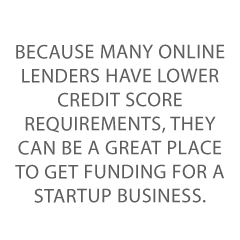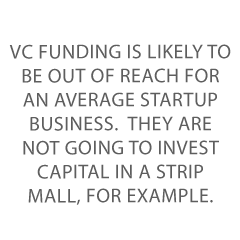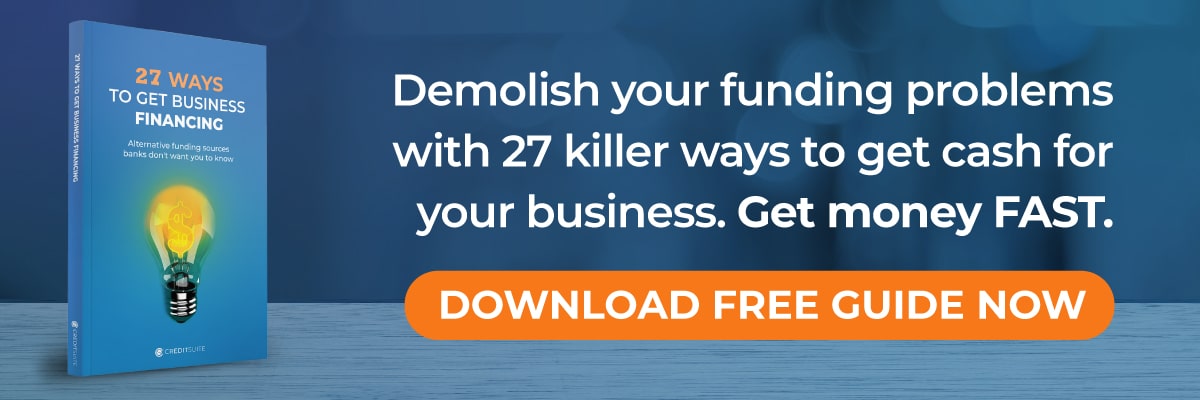Starting a business? Getting capital can be rough, particularly if you have a bad credit score. Fortunately, there are private lenders for business startup loans. Working with an alternative lender could be the best way to get business financing.
Check out the providers and business financing choices we found.
Loan Option 1 – Merchant Cash Advance from National Business Capital
National Business Capital will work with startups with at least six months’ time in business. The startup will have to be earning $120,000 in annual gross sales. But there is no minimum credit score requirement. Therefore, an entrepreneur with bad credit could turn to them.
An MCA isn’t technically a loan. Rather, it is a financing option that allows your business to get capital—quickly and easily—by using future credit card sales.
MCAs are the ultimate bad credit financing option because your credit score does not truly matter. They are far easier to get than nearly any type of business loan.
An MCA will come with a much higher interest rate—and it will also come with a much shorter payment term—than many other funding options.
Because National Business Capital is a fintech marketplace, a startup can potentially get same-day funding.
To apply, they will ask for three months of bank statements, but no tax returns. They will only do a soft pull on your personal credit. NBC does not ask for collateral and they do not require that you provide a personal guarantee.
You can finance up to $5 million. The time to funding is generally one to three days.
Loan Option 2 – Private Funding from Kiavi
For another choice for a real estate startup business loan, Kiavi offers fast closings and a variety of loan choices. These include fix ‘n flip, bridge lending, and rental loans.
With fix ‘n flip and bridge lending, get up to $1.5 million or up to 90% of the purchase price. They offer up to 75% of after-repair value. Kiavi offers a 12, 18, or 24-month loan term with interest-only options. They will only do a soft credit pull credit check.
Kiavi will finance up to 90% of LTC (loan to cost).
For rental loans, they offer up to 75% LTV and no prepayment penalty after Year Three. Small business owners can get a 30-year fixed rate or an interest-only option for this term loan. They also offer adjustable-rate mortgages.
For a rental portfolio small business loan, a small business owner can get a small business loan for a loan amount starting at $500,000. This is for startup business owners with five or more rental properties.
They do not offer preapprovals, but Kiavi will send business owners a pre-qualification summary upon receipt of your application. This summary will also show estimated terms for your business financing choices.
Your personal credit score and real estate exit experience are two of the biggest factors in what leverage option you qualify for.
Loan Option 3 – Small Business Funding from Fora Financial
Virtually every online business lender (such as National Funding) is what you can call a private business lender. That is, they allow you to bypass a bank or other traditional lender. They just do it all online.
Because many online lenders have lower credit score requirements, they can be a great place to get funding for a startup business. All entrepreneurs looking for startup loans should start with online lenders. Chances of approval are better, and you often get the borrowed capital faster.
Fora Financial is an online lender offering small business loans for up to $1.4 million. No collateral is necessary, and you can get a prepayment discount.
Terms are up to 15 months, with approvals in 24 hours. The minimum personal credit score they will take is 500, making their private business funding perfect for entrepreneurs with bad credit.
They also offer a revenue advance option which is essentially a cash advance against future income. Paying it back comes out of a percentage of your incoming receipts and accounts receivable. The amount you pay back per month is based on cash flow.
Get business funding for equipment or expansion. Borrow capital to purchase inventory or to meet payroll.
For a startup business loan based on cash flow, you cannot have any open bankruptcies.
Loan Option 4 – Business Line of Credit from Funding Circle
Funding Circle offers lines of credit for up to $150,000. Get same-day financing. A startup business will only pay interest on the funds in use.
A line of credit is useful for day-to-day expenses, as it works a lot like a business credit card.
They also offer the SBA 7a loan. You can borrow from $75,000 – $5 million, with term lengths of up to 10 years. The Small Business Administration offers the 7a to many American businesses which meet its size requirements. This includes startups.
The 7a can serve as a startup business loan for:
- Long and short-term working capital
- Revolving funds based on the value of existing inventory and receivables
- The purchase of equipment, machinery, furniture, fixtures, supplies, or materials
- Real estate purchasing, including land and buildings
- The construction of a new building or renovation of an existing building
- Establishing a new business or assisting in the acquisition, operation, or expansion of an existing business
- Refinancing existing business debt, under certain conditions
Qualifying for an SBA loan is difficult. For one thing, you need a good business credit and personal credit score. Before you apply, you should be working to build business credit. Fortunately, you can do so even before your startup turns a profit.
Loan Option 5 – Term Loan from Ondeck
Ondeck is another online small business lender. They offer short-term loans, but you will have to be in business for at least one year. They also will lend to no less than a 625 credit score. And, you will have to be able to prove you are making at least $100,000 in annual revenue.
As a result, this is a startup loan only for startups that are more mature. For a startup with less time in business or lower annual revenue, capital from Ondeck is off the table.
For a startup that qualifies, you can get a loan for up to $250,000, with repayment terms of as long as 24 months. Payments are fixed.
Because Ondeck reports to the business credit bureaus, you can build business credit with a loan from them. They also offer benefits for prepaying your loan. Get same-day funding.
Ondeck also offers revolving lines of credit for up to $100,000. They come with a twelve-month repayment term which resets after each withdrawal. You pay off their revolving line of credit with automatic weekly withdrawals.
As a result, startups working with Ondeck must have a business bank account. The credit score requirement for their line of credit is the same as for their loans—625.
Loan Option 6 – Private Business Loan from Lima One
One of the principal uses for a private business loan is real estate financing.
Lima One is a small business lender with options for short-term rental, fix ‘n flip, and new construction.
Get a short-term business loan for rentals, for up to 75% LTV (loan to value) on purchases and up to 70% LTV for a cash-out refinance.
But you must have 12 months of short-term income verification. Since a startup business doesn’t have to be a small business started yesterday, you may be able to qualify.
The minimum personal credit score they accept is 700. There are 5, 10, and 30-year options.
Get fixed rate, ARMs, fully amortizing, interest only, or balloon loans.
For fix ‘n flip or to finance new construction, get up to 90% LTC and 70% LTV. Get loans for up to $3 million, with 13, 19, and 24-month term options. These are for one to four-unit residential properties.
And for a value-add bridge loan, you can get up to 85% LTC and 70% LTV. Loans go up to $20 million or more. Get 24 – 36 month interest-only terms. Low or no cash flow is okay. They service small, medium, or large Cap EX budgets. Non-recourse is available.
Loan Option 7 – Venture Capital or Angel Investing
Any discussion of funding for a startup business would be incomplete without exploring these choices.
But this is not a startup loan. Rather, it is a sale of a piece of the ownership in your business.
VC firms are a species of private equity firms. They often invest in a startup business if they feel it is a game-changer and/or is going to take off very quickly. These tend to be businesses like Zoom, Uber, and even Facebook.
VCs will have a measure of control and will guide business decisions, too.
 VC funding is likely to be out of reach for an average startup business. They are not going to invest capital in a strip mall, for example.
VC funding is likely to be out of reach for an average startup business. They are not going to invest capital in a strip mall, for example.
But an angel investor might.
Angel investors are also buying equity, so their capital contributions are not what you could call a startup loan. However, they are buying a smaller piece of a small business. With less funding comes less control.
Just like any other infusion of capital, you can use financing from angel investors to grow or expand your business, or just to buy supplies or inventory, or meet payroll.
An angel investor’s arrangement with a startup tends to be more informal as well. While an angel investor can be accredited, they don’t have to be. Yes, your mom can be an angel investor.
Types of Private Business Financing
Private business financing runs the gamut from term loans to MCAs to venture capitalist funding. A startup can also get a revolving line of credit, which is a lot like a business credit card.
Many of the factors which will determine the startup’s success rate in applying for these types of funding include:
- The personal credit score of each principal
- Business credit score
- Time in business
- Amount of annual revenues
- Value of collateral on offer
The most common use for private business loans is for real estate investing. Often, this type of lending is for shorter term rehabilitation and fix ‘n flips for rental properties. The financing is a natural fit because the real estate serves as the collateral.
Another common use for this type of startup business lending is loans for owners with poor personal credit. With fewer restrictions, private lenders can get more creative and may overlook substandard credit if a startup has good revenues.
For startups with high growth and earnings potential and a unique, new twist on an existing industry (or the makings of a new industry entirely), venture capitalist firms may become interested.
The advantage of working with VCs is the amount of money involved. But the downside is the loss of some control over the startup.
Pros and Cons of Private Business Loans
The first pro is that bad credit is not a problem. A private business loan is a great solution for a borrower with bad credit. And the business owner won’t have to take out a personal loan. They may be able to avoid having to max out a credit card.
There’s also an easier approval process. Private lender requirements are laxer than those for a regular loan. Underwriting is not as strict as with a traditional lender.
Private lending is flexible and fast. Restrictions on a private business loan are uncommon. Or, at least, the private lender will add fewer restrictions. There is no need to worry about SBA restrictions because the SBA isn’t involved.
One downside is that a private business loan can often bring with it risk—to borrowers and private lenders alike. With less regulation, borrowers might not use a private business loan for its intended purposes. If this happens, a private lender might charge higher interest rates.
Another negative is you should expect less-than-ideal terms. Higher interest rates, a shorter loan term, and a larger down payment amount are all common. Also, there is little to stop private lenders from raising interest rates.
Takeaways
Startup company owners have choices when it comes to getting business loans. Private lenders for business startup loans are just the tip of the iceberg.
Unsure if you qualify? Need some help navigating through your choices? Then contact Credit Suite. We make it our mission to help business owners get the best funding possible. Success is for everyone.

